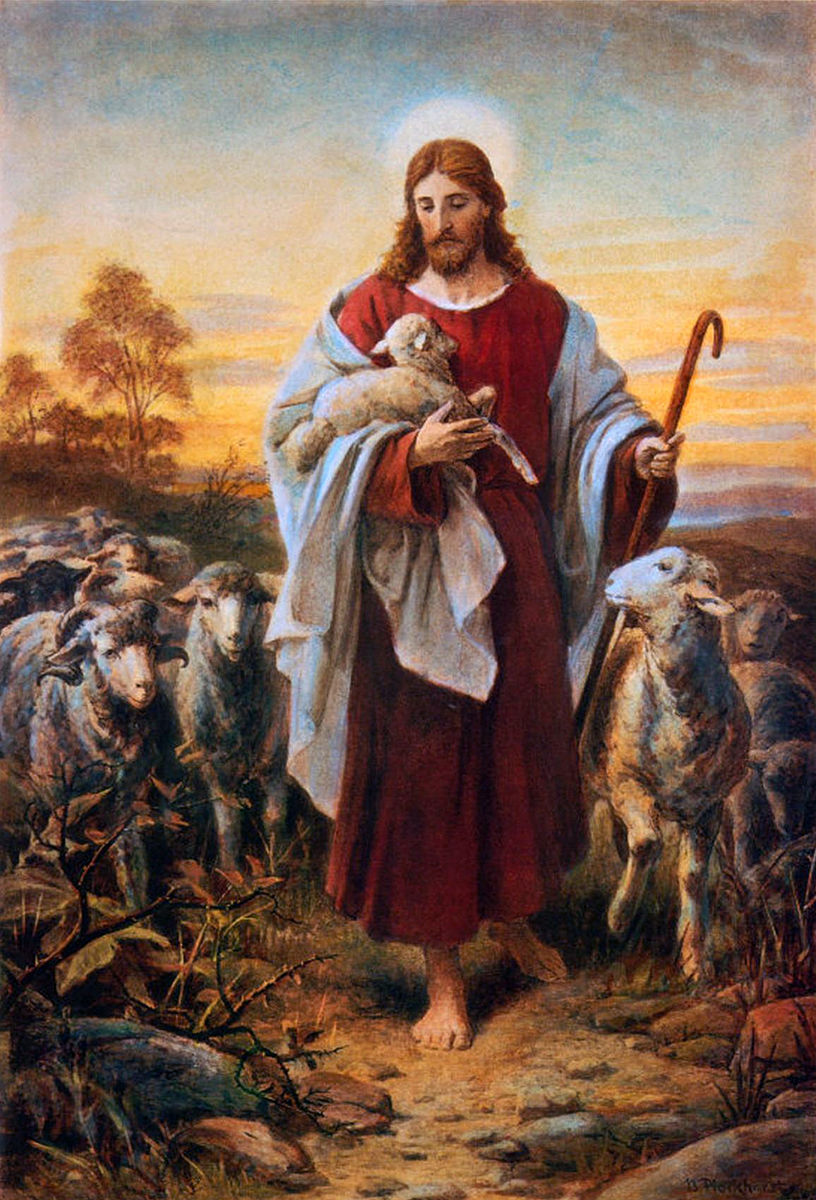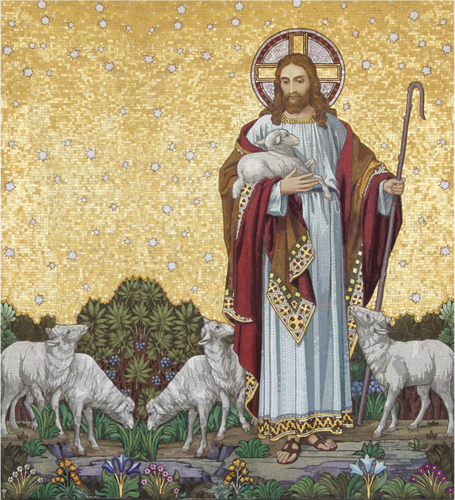John 10:11-16
Pastor James Preus
Trinity Lutheran Church
May 1, 2022
Jesus said, “I am the Good Shepherd.” This is a significant statement. In Ezekiel 34, the LORD God says, “I myself will be the shepherd of my sheep.” And in Psalm 23, David confesses, “The LORD is my shepherd.” So, it is unmistakable, when Jesus calls himself the Good Shepherd, he is calling himself the LORD God. Jesus is the LORD God, and yet he is a man. He even lays down his life for his sheep. God cannot die. God cannot lay down his life. Yet, since God has become man, he does die for our sins and takes his life back again. This teaches us that there is only one Good Shepherd. There is only one God. And there is only one man, who is God, Jesus Christ. And he has proved himself to be the LORD by laying down his life for us and taking it back again. Jesus didn’t just die. He described how he would die and he rise from the dead, and he did it. This is why this is such a wonderful Easter lesson. Jesus, before he suffers and dies, makes the grand claim to be the Good Shepherd, which would mean that he is God, then he declares that he will lay down his life for his sheep and take it up again. And then he does just that.
The Good Shepherd joins his sheep fold. He himself becomes a lamb and dies for his sheep, and then he rises from the dead to shepherd his sheep forever. This is what St. John teaches us in Revelation 7, “For the Lamb in the midst of the throne will be their shepherd, and he will guide them to springs of living water, and God will wipe away every tear from their eyes.” The Lamb will be their Shepherd. As the Shepherd becomes a lamb, so the LORD became a man. And as the Lamb continues to shepherd his sheep, so our Lord Jesus is a man forever. He forever makes intercession for our sins.
There is only one Good Shepherd. If your shepherd is not the LORD God, then he is not the Good Shepherd. If your shepherd did not become a man, then your shepherd is not the Good Shepherd. If your shepherd did not lay down his life for his sheep, then your shepherd is not the Good Shepherd. There is only one Good Shepherd who gives eternal life. Apart from him, you cannot be saved.
Jesus Christ is the Good Shepherd, who lays down his life for his sheep, so that they may have eternal life. And he tells us that he gathers his sheep into one flock. But how does Jesus gather his sheep? We recite from Psalm 23, “He leads me besides the still waters,” but what does that mean? Jesus ascended into heaven. None of us has seen him with our eyes? Jesus says, “They will listen to my voice. So there will be one flock, one shepherd.” Jesus’ sheep listen to his voice. Jesus shepherds his sheep with words.
This is why Scripture uses the word pastor as a name for preachers of God’s Word. The word pastor means shepherd. Now, obviously your pastor is not the Good Shepherd. There is only one Good Shepherd, who is God and man and died for your sins. Your pastor is not God, he is a sinner, and he has not died for your sins. Yet, after Jesus’ resurrection he told Peter to feed his sheep. And St. Paul exhorted the presbyters in Ephesus to “pay careful attention to all the flock, in which the Holy Spirit has made you overseers.” (Acts 20:28) And St. Peter exhorts the presbyters in chapter five of his first epistle, “Shepherd the flock of God that is among you.” (1 Peter 5:2) So, Christ’s ministers are under-shepherds, who care for Jesus’ sheep by using words.
The voice that Jesus’ sheep recognize is not a certain pitch or tone or accents or even a language. Jesus’ voice can be heard in every language, and in multiple tones and accents. Jesus’ sheep recognize his voice by the doctrine, that is, by the teaching, which that voice teaches. This is why Jesus keeps repeating, “I lay down my life for the sheep.” This is the chief doctrine that reveals the voice of the Good Shepherd. Jesus died for the sins of all people. Whoever trusts in Jesus’ suffering, death, and resurrection for forgiveness and salvation will be forgiven and be saved. So, if a voice does not preach Christ crucified, or denies that Jesus’ death makes atonement for all our sins, then that is not the voice of the Good Shepherd.
Many preachers get bored with the Gospel. So, they try to make their preaching more relevant to their hearers, by discussing issues that are more relevant for the here and now. Heaven is a far way off, but I need advice for today. Yet, what does Scripture say? “If in Christ we have hope in this life only, we are of all people most to be pitied.” (1 Corinthians 15:19) Jesus died so that we might have eternal life. It is the job of the preacher to proclaim eternal life. Eternal salvation is always relevant. And you will not figure out how to sort out your life if you neglect your eternal life.
This lesson gives opportunity to warn Jesus’ sheep against false prophets, who, Jesus tells us, come to you in sheep’s clothing, but inwardly are ravenous wolves (Matthew 7:15). Jesus tells us that we will know them by their fruits, that is, by their teaching. So, Jesus’ little lambs must pay attention to what is being taught to them. They must discern whether the preacher is preaching the Law and the Gospel from the Bible or whether he is teaching some human commandment; whether he is preaching the way to eternal life through faith in Jesus, who alone laid down his life for his sheep, or whether he is preaching a different way that leads to hell.
Yet, it has become so dire, that the wolves don’t even need to wear their sheep skins to fool the sheep. People will listen to enemies of the Gospel with reckless abandon while ignoring the voice of their Good Shepherd, as if these voices will have no affect on them. Consider this though, how much time in a week do you spend watching television or some other streaming service, or listening to the radio, or reading secular articles and books and how much time do you spend hearing the Word of God at church or reading your Bible at home? Do you know what your children are watching on the internet?
Recently, Disney has been criticized, because the children’s entertainment company opposed a bill in Florida, which would make it illegal for public school teachers to talk about sexual topics with children third grade and under. In response, supporters of the bill accused Disney of being “Groomers.” Groomers are perverted adults, who use their influence over children to manipulate them so that they may take advantage of them and that they might become perverts like them. It is a form of child abuse. It’s a very offensive title to give someone. Yet, the title fits. Disney, Nickelodeon, YouTube for kids, and many other children entertainment companies have been producing content, which encourages young children to support and explore homosexuality and transgenderism. This includes cartoons. People are rightly horrified by this. Yet, most continue to watch movies and shows from these companies and permit their children to watch this content as well, often without reviewing the content beforehand. But even if you avoid the most offensive content, mass entertainment is filled with messaging that is contrary to the Christian faith. And it has been from the beginning! Disney and Hollywood have been promoting pantheism, moral relativism, the occult, evolution, fornication, and many other messages contrary to what God teaches us in the Bible.
Do these messages affect you and your children? Of course, they do; especially if you consume many hours of this content. Yet, even if you try to avoid these bad messages (which you should), you’ll never completely silence them. You still live in this world. And even if you did silence them, you’d still have your old sinful nature to lead you astray. “All we like sheep have gone astray. We have turned, every one, to his own way.” But now we have returned to the Shepherd and Overseer of our souls.
We need to hear Jesus’ Word. We need to hear his voice. We must be taught what is right. We must learn to turn from our sins and fight our fleshly desires, to reject being conformed to this world. We need to learn that we are sinners, who need a Savior. We need to hear that Jesus laid down his life for us, so that we might have abundant life. But if you will not hear this voice, then you are not Jesus’ little lamb.
People think that they can be Christians without hearing the voice of their Shepherd. But that’s not true. Jesus says that whoever does not gather with him scatters. What would a flock of sheep look like if the sheep didn’t come when the shepherd called? It would look scattered, wouldn’t it? We need to hear the voice, that is, the teaching of our Good Shepherd Jesus, so that we may have eternal life.
Jesus says, “I know my own and my own know me.” With these words he teaches election. Election is the teaching that Jesus’ sheep are chosen before the foundation of the world (Ephesians 1:4). This is why Jesus says that many are called, but few are chosen. Jesus desires all to be saved. That is why he calls them. But only those who are chosen are ultimately saved. This is a comforting message, because it gives us certainty of salvation. Jesus says in this same chapter of John, “My sheep hear my voice, and I know them, and they follow me. I give them eternal life, and they will never perish, and no one will snatch them out of my hand. My Father, who has given them to me, is greater than all, and no one is able to snatch them out of the Father’s hand.” (John 10:27-29) This is immensely comforting, because no one can snatch you out of your Good Shepherd’s hand. No one can take the life Jesus has given to you away from you. It has been determined before the foundation of the earth.
Yet, how can you know that you are elect? How do you know that God has chosen you before the foundation of the world? Because you hear his voice and follow him. Don’t try to delve into the mysteries of God’s mind, which not even the angels can comprehend. Rather, listen to the voice of your Good Shepherd. The Good Shepherd lays down his life for the sheep. Jesus’ sheep hear his voice and follow him. Jesus gives his sheep eternal life. If you hear this voice and believe it, then you are Jesus’ sheep. You are elect. No one can snatch you out of the Father’s hand.
Before you knew him, your Good Shepherd knew you. And he has made himself known to you by the proclamation of his Gospel. He died, so that you may live. He promises you eternal life. If you believe this, you are most certainly Jesus’ little lamb. Amen. Let us pray.
Lord, my Shepherd, take me to Thee.
Thou art mine; I was Thine,
Even ere I knew Thee.
I am Thine, for Thou hast bought me;
Lost I stood, But Thy blood
Free salvation brought me. Amen.


 RSS Feed
RSS Feed